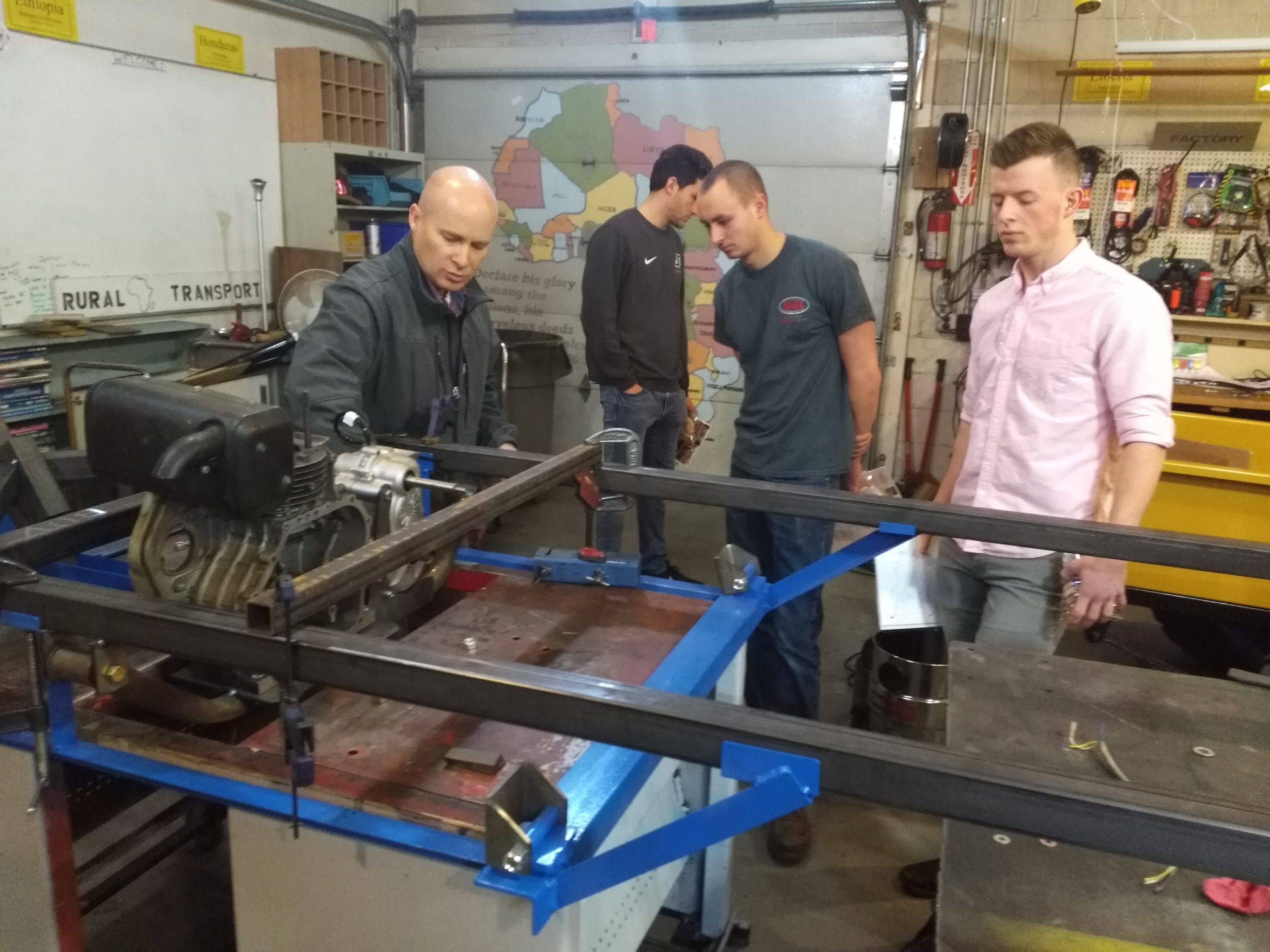R.B. Annis School of Engineering expands impact with global project

Students at the R.B. Annis School of Engineering at the University of Indianapolis had the chance to apply their skills to solve a real-world problem with a far-reaching impact. The Annis School partnered with the Indianapolis-based Institute for Affordable Transport (IAT), which connects communities in developing countries with basic transportation and vehicles that feature robust and simple designs.
The idea got off the ground when David Olawale, assistant professor of engineering, contacted IAT to explore an industry-based project for the Manufacturing Processes course taken by senior mechanical engineering (ME) students. The goal was to give students the opportunity to apply the knowledge and skills from the course on a real-life project. In addition, the project had a service component in which the UIndy engineering students were able to apply their knowledge to help in making a product more affordable and accessible to many in developing nations.
“The challenges [the students] faced in working with their team, clients and different stakeholders are critical experiences they get to share during job and internship interviews, thereby setting them apart from other graduates,” Olawale said.
The project was a perfect fit with the Annis School’s mission to use interdisciplinary education to develop modern engineering leaders who create outstanding solutions, he added. The Annis School focuses on providing unique experiential learning opportunities for students through real world open-ended, industry-based projects.
“The complexity of such problems and the exposure of students to such problems help them in developing effective problem-solving, teamwork, and communication capacity that are not readily possible with textbook-based problem-solving. Such exposure helps students to understand the needs of the industry and how to solve problems for the industry,” Olawale explained.
Working alongside David Olawale and Mechanical Systems Laboratory Manager James Emery, three mechanical engineering students—TJ LeSeure ’20, Payton Staman ’20, and Jake Braumbaugh ’20—were tasked with designing a power platform fixture for the IAT’s Basic Utility Vehicle (BUV). The BUVs are used in some developing nations as a multifunctional vehicle for transporting people, animals, water, food and construction materials. It can be a game changer for many communities in developing nations in terms of economic growth, access to clean water, food security and medical supply transportation.
In order to simplify the assembly process of the vehicles, IAT asked that UIndy’s team design a fixture for the assembly of the motor deck. The motor deck holds two components, the motor and the transmission. The student team was asked to design the fixture for the motor deck by incorporating their knowledge of jig and fixtures, design for manufacturing and additive manufacturing. Working with lab manager James Emery, the students learned how to work with production experts to successfully translate a design into a manufacturable product.
LeSeure said, “My favorite part of the project was being able to apply the things I learned in the classroom to a project that would help improve people’s lives. It was truly a rewarding experience that helped me tap into the passionate side of engineering.”
Students learned to work in a team environment as they communicated effectively with the client through site visits, video conferencing and emails to gain a good understanding of the client’s requirements and needs. New knowledge from the manufacturing processes course was applied in the design of the fixture for the automotive component. Students also developed their resilience and resourcefulness in creating a viable solution for an industry-client even in the midst of the COVID-19 pandemic and its challenges.
Industry client Will Austin was impressed with the results. “We have completed over 50 engineering projects with 20 different universities during the last 20 years. Sometimes we learn a more simple or more cost-effective solution. Sometimes we merely learn what not to do. In the case of UIndy, we are using their fixtures in BUV production, and we are very pleased with the performance of the fixtures,” Austin said.
Austin placed an order for four more fixtures to be fabricated by the Annis School’s technical staff to be delivered to the client’s customers in Africa, the first of which are in northern Benin, West Africa.
“I really enjoyed working with the UIndy students. They were very prepared for the calls and kept me updated on developments. The engineers made good progress on the project despite COVID setbacks,” Austin added. “The end result was an excellent fixture that will be used with our next factory partners.”
The R.B. Annis School of Engineering will continue to work with IAT through the DesignSpine curriculum.
